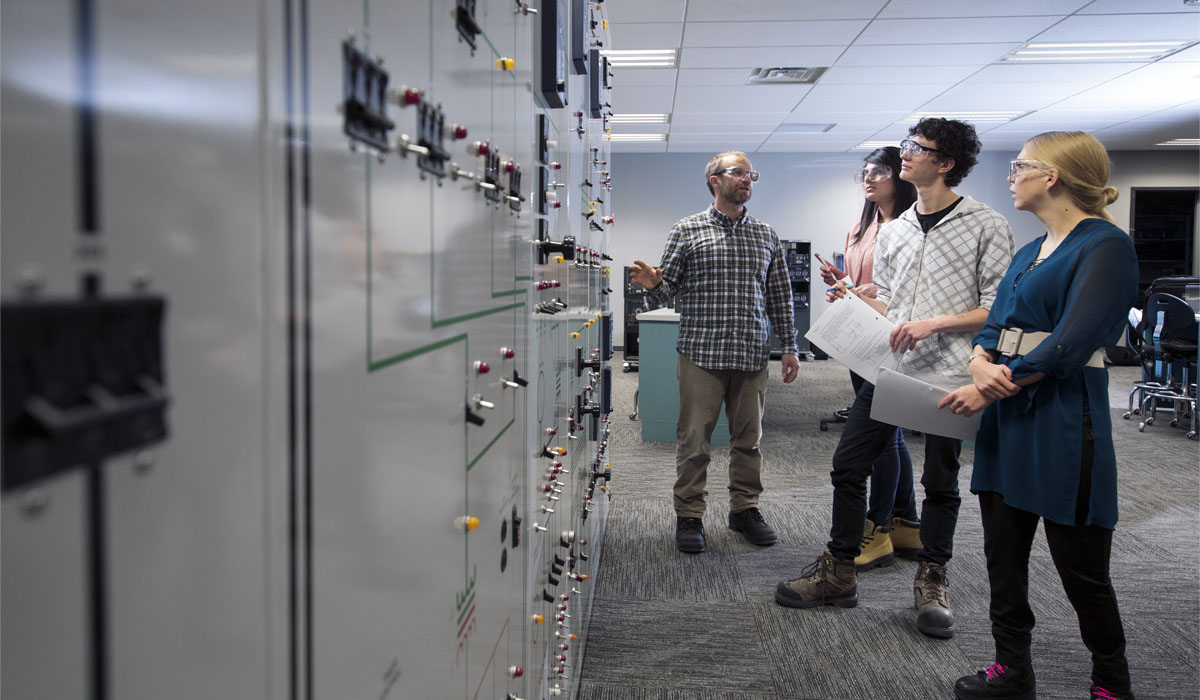Overview
Power engineering is a high-demand field with strong earning potential and long-term stability. Certified Fourth Class Power Engineers operate and maintain energy systems in medium-sized heating and power plants across industrial, commercial, and institutional settings to ensure safe and efficient power generation and heating.
The Fourth Class Power Engineering Certificate of Achievement program prepares you to write the Alberta Boilers Safety Association (ABSA) Fourth Class Part A and Part B theory exams. This certificate program will also prepare you for our PWEN 005 Fourth Class Power Engineering Lab — an option for you if you don’t have ABSA’s six-month work experience/steam time requirement for Fourth Class certification.
Learn the theory online with instructor support — on your schedule. You’ll explore boiler construction, combustion systems, plant operations, refrigeration, and HVAC fundamentals. You’ll learn to operate and troubleshoot boilers, turbines, compressors, pumps, and safety systems and understand energy plant maintenance, water treatment, and industrial plant configurations. The program also builds your technical knowledge in material science, welding principles, electrotechnology, and fluid handling systems.
This course is ideal if you:
- want a clear path to a stable, rewarding career as a Fourth Class Power Engineer
- want to work your way up to Third Class and higher in the future
- seek theory training recognized by ABSA to write Fourth Class theory certification exams
- need a flexible, part-time learning option.
To be successful in this program, we recommend you have a minimum 50% in Grade 10 Math, English, Science (Physics). If you haven’t completed these courses, consider taking Academic Upgrading courses first.
Upon successful completion of this program, you’ll be able to:
- identify and operate piping, valves, and steam traps for boiler operation
- demonstrate the safe operation of pumps, boiler feedwater pumps, and water softener systems
- understand the process of preparing raw water for steam production
- operate medium-pressure steam boilers, low-pressure firetube boilers, and hot water heating boilers
- demonstrate the safe operation of non-condensing and condensing turbines
- operate refrigeration systems, air compressors, internal combustion engines, and gas turbines
- interpret HVAC system operations and understand building environmental systems and control
- understand the fundamentals of lubrication, bearings, pumps, and compressors
- explain boiler safety devices and describe boiler plant operations and management
- discuss energy plant maintenance, water treatment, and typical industrial plant configurations
- describe the design and operation of various prime movers and heat engines
- explain plant auxiliary systems and basic concepts of compression and absorption refrigeration
- perform preparatory math topics and basic calculations related to elementary mechanics and dynamics
- apply elementary physical, chemical, and thermodynamic principles
- understand power engineering governance in Canada
- explain plant and fire safety and describe plant operations and environmental considerations
- understand material science and welding principles
- demonstrate knowledge of fluid handling technology and fundamental electrotechnology concepts
- describe energy plant instrumentation and controls, and use fundamental industrial communication tools
- explain the fundamentals of boiler design and various boiler system elements.
Program outline
To earn this certificate, you must complete the two mandatory theory courses below. PWEN 002 Part A must be taken before PWEN 112 Part B. A SAIT Certificate of Achievement is issued only upon successful completion of both courses at SAIT.
The mandatory prerequisite for PWEN 112 Part B may alternatively be met with a course completed at an ABSA-recognized educational institution, provided it aligns with the current IPECC curriculum. An official result letter showing your final grade from the education provider is required.
The PWEN 005 Fourth Class Power Engineering Lab is a standalone course available in addition to this certificate.
Required courses & electives
How to apply for this certificate
Once you have registered for any course offered in this certificate, you will be automatically eligible to complete the certificate. You will have up to three years to complete this program. You may track your progression by signing in to your Continuing Education student account.
Certifications and professional designations
Upon successful completion of all required courses, you’ll receive an official SAIT Certificate of Achievement and transcript issued electronically.
SAIT will also provide an official result letter for each course completed, which you can submit with your application to write the ABSA Fourth Class Part A and Part B theory certification exams.
To receive the ABSA Fourth Class Certificate of Competency (license to work as a Fourth Class Power Engineer), you’re also required to provide proof of operational experience/steam time in a power or heating plant. If you cannot obtain this supervised experience through current work/employment, consider taking our PWEN 005 Fourth Class Power Engineering Lab, which will qualify you for ABSA’s six-month experience requirement.
Power Engineering certification requirements and transfer provisions vary by province and territory across Canada. Check with the regulatory authority where you plan to work:
- Planning to work in Alberta? Contact ABSA.
- Planning to work elsewhere in Canada? Contact the local boiler branch in that jurisdiction.
Costs
This certificate program consists of two courses with varying fees. Please review the individual course pages for this certificate program to determine costs and to learn more about additional learning materials including textbooks.
Financial support
Financial opportunities are available to help pay for your course fees. Learn more about how to reduce your education or training costs with available awards, bursaries, loans and grants, including the Canada Alberta Productivity Grant.
Careers and opportunities
The training received during this certificate program will be a starting point for a Power Engineering career.
After you have completed both the theory and the lab portion or the equivalent amount of experience required, and have been certified by ABSA, you may be able to explore career opportunities as a Fourth Class operator in a power plant or heating plant.
Stories and news

Alberta companies look to workforce training to close critical skills gaps
The Southern Alberta Institute of Technology (SAIT) provides corporate training to help businesses boost productivity and workplace performance.

Donor created space enables cybersecurity training for students and industry
The new SAIT Cyber Range creates an immersive cybersecurity training facility for students and industry in downtown Calgary.

Oki, Âba wathtech, Danit'ada, Tawnshi, Hello.
SAIT is located on the traditional territories of the Niitsitapi (Blackfoot) and the people of Treaty 7 which includes the Siksika, the Piikani, the Kainai, the Tsuut’ina and the Îyârhe Nakoda of Bearspaw, Chiniki and Goodstoney.
We are situated in an area the Blackfoot tribes traditionally called Moh’kinsstis, where the Bow River meets the Elbow River. We now call it the city of Calgary, which is also home to the Métis Nation of Alberta.




